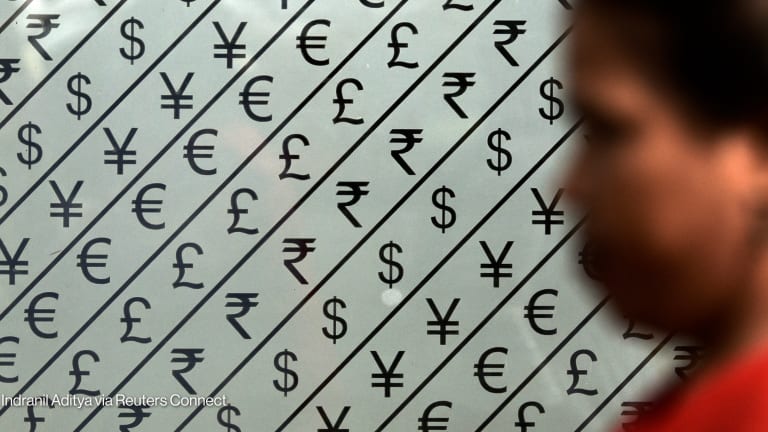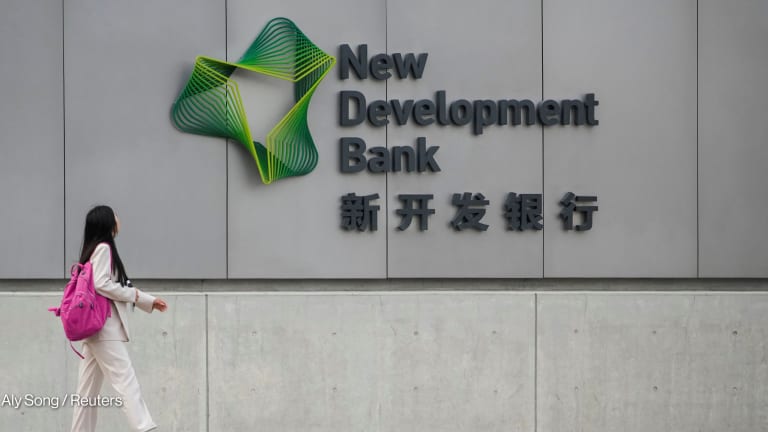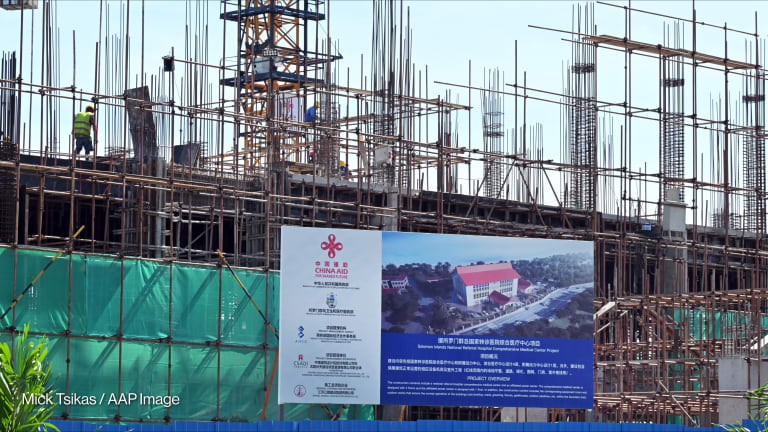Interactive: Explore the World Bank's funding pipeline from 2019 to 2021
Find out how Devex makes it easy to explore upcoming funding opportunities with the World Bank with a breakdown of the bank's monthly operational summary.
The World Bank Group has funded development projects in over 180 countries to achieve its goal of ending extreme poverty and promoting shared prosperity. In its monthly operational summary, the bank provided an overview of projects in the pipeline: from the time identified to the signing of the credit, grant, or loan agreement — detailing the projects currently in preparation too. The MOS offered a quick glance on the relevant information that helped organizations and development professionals assess their capacity and interest in implementing these projects. This year, the bank has decided to discontinue the publication of its monthly operational summary and urged organizations and development professionals to use its operations portal instead. Although the operations portal still provides a list of projects, there are some missing information that was available in the MOS report. This includes the actual status of projects in the planning stage and co-financing, and some projects’ target sector. Devex closely monitored the MOS data to provide insights on the bank’s early project cycle and future funding priorities. Keep reading to gain a better understanding of the MOS and how to better navigate it with Devex’s funding search and interactive visualization. A guide to the World Bank MOS The World Bank released its operational summary every month through the UN Development Business website, with data spanning from January 2012 until January 2022. Each entry contained the following essential information: the name of the client country, sectors, project title, project description, project identification number, funding amount, and implementing agency. Some project titles are preceded by a letter in parentheses: - (N) The project is new and was just added to the pipeline this month. - (R) Some parts of the project have been revised since last month. The project cycle The World Bank’s MOS reported on the status of the project, and each entry indicated at which point the operation was in the project cycle. Familiarity with the bank’s project cycle helped potential bidders identify business opportunities — business developers used the MOS as a guide to understand short- and long-term funding priorities, which enabled them to prepare accordingly. Normally, it takes 13 months for a project to go through the whole process, although this can vary. The cycle consisted of the following steps: Identification: Specific operations are identified to support the client’s country development strategy and the World Bank’s Country Partnership Framework. Preparation: Technical and institutional alternatives are discussed to achieve the objectives of a project. It usually requires feasibility studies and environmental assessment done by the client’s hired consultants. Appraisal: A comprehensive review of the project is conducted by experts from World Bank, who look at the technical, institutional, economic, and financial aspects. This lays the foundation for the implementation and evaluation stage. Negotiations: A final deliberation is carried out by the client state and the bank until they reach an agreement written in the loan documents. This is to be presented to the World Bank’s board of directors for approval. Implementation: Once the project financing agreement is signed, the client state has full responsibility for the execution of the project through implementing agencies. This is a great time for contractors and suppliers to express their interest and obtain information on bid proposals and submission of the goods and services depending on the need of the project. Explore the World Bank MOS on Devex Devex provides a straightforward navigation of each project in the MOS. These projects are tagged as funding activity reports and operational document sources, including early-stage funding opportunity information. They are easily searchable and filterable using Devex’s funding search dashboard. Members can further explore the MOS and analyze the data using this interactive visualization. The dashboard provides an aggregated data summary of the monthly operations, such as total number and amount of the pipelines, pipelines by country and by sector, and a complete list of the projects. MOS analysis Beginning December 2019, Devex has collated information about the World Bank's funding pipeline through the bank's monthly operational summary. Below are the analyses of the MOS from 2019 to 2021. 2021 project pipeline In 2021, the World Bank allocated $73.39 billion for 554 new projects — an increase of $13.9 billion, or 23.4%, from the previous year. Other donors such as the Asian Development Bank, Asian Infrastructure Investment Bank, Japan International Cooperation Agency, and KfW provided an additional $6.03 billion. Almost half of the funding for new projects went to just three regions: South Asia with $13.39 billion, West Africa with $11.61 billion, and Latin America and the Caribbean with $8.85 billion. South Asia and West Africa were also among the most funded in 2020, while Latin America and the Caribbean overtook East Asia and the Pacific. The rest is divided among other Asian and African regions and Eastern Europe. Among the countries, India remains the most funded with $6.91 billion — $1.5 billion more than the previous year. This accounts for 51.7% of the allocation to South Asia and 9.4% of the total funding. Bangladesh ranked next with $3.4 billion — $653.5 million more than the previous year — while funding to Ethiopia tripled from $1.05 billion in 2020 to $3.09 billion in 2021. Health remains the priority sector with $12.99 billion — $3.76 billion more than 2020. It accounted for 17.7% of the total allocation for 2021. The biggest chunk, worth $8.86 billion, went to COVID-19 responses, including vaccine rollouts. The remaining amount went to projects such as strengthening health care systems and supporting maternal and child health. Transport saw the biggest leap among all sectors. The total funding was $10.18 billion or 13.9% of the total allocation for 2021 — $5.37 billion more than 2020. This increase is due to the addition of 19 more projects in 2021. The projects ranged from improving transport accessibility, constructing roads, to financing transit systems. Energy received $2.6 billion more than the previous year, with $7.96 billion or 10.9% of the total allocation for 2021. The projects include modernizing power grids, expanding and increasing power supply, and supporting the transition to clean energy. The remaining $42.25 billion went to all the other sectors including agriculture, education, environment, finance, and water. 2020 project pipeline summary In sum, 605 new projects worth $70.4 billion were added to the pipeline in 2020 — $59.5 billion came from the World Bank and $10.9 billion from other donors. This translated to an average of 50 projects added each month. March saw the biggest jump with 115 new projects — 21 new projects were announced in February. The increase was largely due to the World Bank’s COVID-19 immediate response, with 69 new COVID-19 projects worth $4.3 billion added in March. In 2020, 223 COVID-19 projects worth $17.2 billion were added to the pipeline. There were two top funded projects: The Emergency Response and Health Systems Preparedness Project in India and the Income Support for Vulnerable Groups Project in Brazil, with $1 billion each. Zooming into new projects added in 2020, the largest funding allocation went to India with $5.4 billion for 21 projects, which ranged from health and nutrition to transport. Indonesia followed, with $3.5 billion for 16 projects, and then Bangladesh, with $2.7 billion for 15 projects. The Agro-Climatic Resilience project in Nigeria was also among the new projects with most funding, with $700 million from the World Bank. The project promoted sustainable landscape management practices and improved watershed services in the country. By sector, World Bank pipeline priorities were health, nutrition, and population, receiving a total of $9.2 billion for 164 new projects. Social protection and jobs ranked next with $7.3 billion for 56 projects, then urban, resilience, and land with $5.6 billion for 38 projects. 2019 project pipeline summary In 2019, the World Bank funded a total of 13,767 projects that cost $1.49 trillion. This translated to an average of 1,147 projects with $124 billion allocations each month. Funding consistently increased throughout the year with only a slight drop in September worth $1 billion. December set the highest number of projects with 1245, 488 of which were approved. On average, 48 new projects entered the 2019 pipeline while 470 projects moved to the implementation stage. December had the highest number with 92 new projects, while February had the lowest, with 27 new projects. For approved projects, September set the highest number with 503 projects and February had the least with 421 projects. It is noteworthy that a single project — the Upper Mahaweli watershed project in Sri Lanka — received top funding worth $1.67 billion. Additionally, the top-funded countries for the 2019 pipeline were the Democratic Republic of the Congo and Nigeria, each receiving an average of $1 billion. The Solomon Islands had the least amount of funding with $500 million. In terms of sector, energy and transport were the most funded with an average of $17 billion, digital development and governance received the least amount of funding with an average of $3 billion.
The World Bank Group has funded development projects in over 180 countries to achieve its goal of ending extreme poverty and promoting shared prosperity.
In its monthly operational summary, the bank provided an overview of projects in the pipeline: from the time identified to the signing of the credit, grant, or loan agreement — detailing the projects currently in preparation too. The MOS offered a quick glance on the relevant information that helped organizations and development professionals assess their capacity and interest in implementing these projects.
This year, the bank has decided to discontinue the publication of its monthly operational summary and urged organizations and development professionals to use its operations portal instead.
This story is forDevex Promembers
Unlock this story now with a 15-day free trial of Devex Pro.
With a Devex Pro subscription you'll get access to deeper analysis and exclusive insights from our reporters and analysts.
Start my free trialRequest a group subscription Printing articles to share with others is a breach of our terms and conditions and copyright policy. Please use the sharing options on the left side of the article. Devex Pro members may share up to 10 articles per month using the Pro share tool ( ).
Janadale Leene Coralde works as a contributing analyst for Devex. Based in Manila she reports on development donors activities and designs funding data visualisations. She has a degree in political economy, specializing in international relations and development, and has previously worked as a researcher for Chemonics, the REID foundation, and the Philippines House of Representatives.
Miguel Tamonan is a Senior Development Analyst at Devex, where he analyzes data from public and private donors to produce content and special reports for Pro and Pro Funding readers. He has a bachelor’s degree in Political Science with a Major in International Relations from the Polytechnic University of the Philippines.









